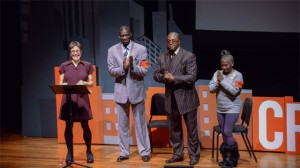The Creative Time Summit, an annual conference on art and social activism that took place last week in New York, featured many powerful speakers, including Rick Lowe, San Francisco’s own Rebecca Solnit, and Lucy Lippard. Artists Gregory Sholette, Risë Wilson, and Mel Chin, among others, moderated provocative panel discussions that interrogated the role of art in urban life. For the expansive global community of cultural practitioners — artists, writers, curators and activists — invested in art and social change, the conference offers an unparalleled abundance of information and opportunities to connect with peers. This year the Summit also offered one of the most moving experiences of my so-called art life: an unscripted moment of profound humanity.
Following the presentation of the Leonore Annenberg Prize for Art and Social Change to Khaled Hourani and Laurie Jo Reynolds respectively, each recipient gave a talk on stage. Reynolds was honored for her unique brand of “legislative art,” work that participates and intervenes in government activity to affect political change. For the last eight years Reynolds has contributed to a collective called Tamms Year Ten, a volunteer grassroots campaign that focused its creative actions on closing Illinois’ Tamms Correctional Center, a prison designed for sensory deprivation where inmates were held in solitary confinement, many for years. On stage with Reynolds were survivors Darrell Cannon and Reginald “Akkeem” Berry, Sr., along with Brenda Townsend, whose son was held at Tamms and is now incarcerated elsewhere. (Tamms was closed in January of this year, in large part due to Reynolds’ work.) At the end of her talk, Reynolds informed the audience that, in conclusion, Cannon and Berry would stand on stage one minute for each year they were held in solitary; Townsend would stand in place for her son. The lights in NYU’s massive Skirball Center were dimmed and the room fell to a hush.
As I watched, I wondered what it must be like to be locked away from the world in a small cell with no human contact for years on end. I thought about how Cannon and Berry have dedicated their lives to peaceful prison reform, after having survived incomprehensible cruelties. I thought too about this summer’s sixty-day hunger strike by more than 30,000 participants across California’s prison system initiated to bring public awareness to the conditions and effects of long-term solitary confinement as a prison management strategy and a human rights issue. The strike ended on September 5 and public awareness of the prisoners’ largely unmet demands essentially disappeared; Senator Loni Hancock (D-Berkeley), Chair of the Senate Public Safety Committee, and Assembly member Tom Ammiano (D-San Francisco), Chair of the Assembly Public Safety Committee, jointly announced that there would be a public hearing in October, but no hearing has taken place and no further plans have been announced. Today more than 3,500 prisoners remain in solitary confinement in California’s prison system.

Darrell Cannon, Reginald “Akkeem” Berry, Sr., and Brenda Townsend of the Tamms Year Ten project; photo by Casey Kelbaugh, courtesy Creative Time
After about three minutes on stage, Townsend began to weep. Though she continued to stand in place, she turned her back to the audience momentarily to regain composure before facing forward again. In that moment, I saw a woman openly suffering for her child and palpable evidence of the rippling pain wrought on families and communities as a result of an inhumane system.


